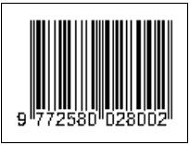English for Engineering at Defence Industry: A Language Metamorphosis?
Downloads
Alqahtani, M. A. (2015). Teaching English for specific purposes: Attitudes among saudi engineering students. English Language Teaching, 8(7), 76–94. https://doi.org/10.5539/elt.v8n7p76
ASD. (2015). Simplified Technical English. Information - Wissenschaft & Praxis, 35(4).
Branch, M. A. E., & Branch, A. E. (2012). Elements of Shipping. In Elements of Shipping. https://doi.org/10.4324/9780203929971
Caissie, K. B. (1978). A Handbook for Teaching Technical English.
Doecke, B. (2017). What Kind of ‘Knowledge' is English? (Re-reading the Newbolt Report). Changing English: Studies in Culture and Education, 24(3), 230–245. https://doi.org/10.1080/1358684X.2017.1351228
Doecke, B. (2019). Rewriting the History of Subject English through the Lens of ‘Literary Sociability.' Changing English: Studies in Culture and Education, 26(4), 339–356. https://doi.org/10.1080/1358684X.2019.1649116
Dressman, M. R. (2007). The history of the English language course: A cross-disciplinary approach to the Humanities. Arts and Humanities in Higher Education, 6(1), 107–113. https://doi.org/10.1177/1474022207072232
Etteplan. (2018). ASD-STE100 – Simplified Technical English for Aerospace and Defense. 1–26. https://www.simplifiedenglish.net/library/asd-ste100-simplified-technical-english/
Hadjiconstantinou, S. (2021). Multimodal texts in support of linguistic and critical thinking development in English for specific purposes. Tertiary Education Language Learning: A Collection of Research, 2021, 29–45. https://doi.org/10.14705/rpnet.2021.51.1253
Hewings, M. (2002). English for Specific Purposes: Editorial. English for Specific Purposes, 21(3), 209–210. https://doi.org/10.1016/S0889-4906(01)00047-3
Hogg, R., & Denison, D. (2006). A history of the english language. In A History of the English Language. https://doi.org/10.1017/CBO9780511791154
Irudayasamy, J., Souidi, N. M., & Hankins, C. (2020). Impact of an esp course on english language proficiency of undergraduate engineering students: A case study at Dhofar University. International Journal of Higher Education, 9(2), 309–320. https://doi.org/10.5430/ijhe.v9n2p309
Kaowiwattanakul, S. (2020). Using literature circles to promote the english speaking skills of engineering students in English for specific purposes classrooms. LEARN Journal: Language Education and Acquisition Research Network, 13(2), 414–425.
Kim, E. G., Kweon, S. O., Lee, J. A., & Park, S. (2021). Professional development for science and engineering professors offering English-medium instruction. Language Teaching Research. https://doi.org/10.1177/13621688211020915
Kiss, T., & Mizusawa, K. (2018). Revisiting the Pedagogy of Multiliteracies: Writing Instruction in a Multicultural Context. Changing English: Studies in Culture and Education, 25(1), 59–68. https://doi.org/10.1080/1358684X.2017.1403283
Kornieva, Z., & Vashchylo, O. (2021). Development of Speaking Skills Assessment Criteria for Engineering Students. Arab World English Journal, 12(2), 72–82. https://doi.org/10.24093/awej/vol12no2.5
Lim, F. V. (2020). Correction to: Developing a systemic functional approach to teach multimodal literacy. Functional Linguistics, 7(1). https://doi.org/10.1186/s40554-020-00072-1
Lu, D. D. (2011). Fundamentals of Supply Chain Management. In Journal of the Royal Society of Medicine. Ventus Publishing Aps. https://doi.org/10.1177/014107689809101016
O'Hallaron, C. L., Palincsar, A. S., & Schleppegrell, M. J. (2015). Reading science: Using systemic functional linguistics to support critical language awareness. Linguistics and Education, 32, 55–67. https://doi.org/10.1016/j.linged.2015.02.002
Özer, S. (2020). Foreign language learning effort levels of students in English for specific purposes. Journal of Language and Linguistic Studies, 16(3), 1352–1367. https://doi.org/10.17263/jlls.803772
Peter, C. (2017). Importance of Standards in Testing Technical English for Engineering Students of Tamil Nadu. International Journal of Educational Sciences, 16(1–3), 36–42. https://doi.org/10.1080/09751122.2017.1311593
Rus, D. (2019). Assessment Techniques in Teaching English for Specific Purposes to Engineering Students. Procedia Manufacturing, 32, 368–373. https://doi.org/10.1016/j.promfg.2019.02.227
Rus, D. (2020). Creative methodologies in teaching English for engineering students. Procedia Manufacturing, 46, 337–343. https://doi.org/10.1016/j.promfg.2020.03.049
Salmani-Nodoushan, M. A. (2020). English for specific purposes: Traditions, trends, directions. Studies in English Language and Education, 7(1), 247–268. https://doi.org/10.24815/siele.v7i1.16342
Tsai, P. S., & Liao, H. C. (2021). Students' progressive behavioral learning patterns in using machine translation systems – A structural equation modeling analysis. System, 101(August), 102594. https://doi.org/10.1016/j.system.2021.102594
Whyte, S. (2017). New developments in ESP teaching and learning research. In New developments in ESP teaching and learning research. https://doi.org/10.14705/rpnet.2017.cssw2017.9782490057016
Xia, S. A. (2020). English for Specific Purposes in the Digital Era: What Has Changed? Interview with Vijay Bhatia. RELC Journal, 51(1), 188–197. https://doi.org/10.1177/0033688219895328
Zare Behtash, E., Hashemi Toroujeni, S. M., & Safarzade Samani, F. (2017). An Introduction to the Medieval English: The Historical and Literary Context, Traces of Church and Philosophical Movements in the Literature. Advances in Language and Literary Studies, 8(1), 143. https://doi.org/10.7575/aiac.alls.v.8n.1p.143
Copyright (c) 2022 ETNOLINGUAL

This work is licensed under a Creative Commons Attribution-NonCommercial-ShareAlike 4.0 International License.
1. Copyright of this journal is possession of Editorial Board and Journal Manager, by the knowledge of author, whilst the moral right of the publication belongs to the author.
2. Legal formal aspect of journal publication accessibility refers to Creative Commons Atribusi-Non Commercial-ShareAlike (CC BY-NC-SA),implies that publication can be used for non-commercial purposes in its original form.
3. Every publications (printed/electronic) are open access for educational purposes, research, and library. Other that the aims mentioned above, editorial board is not responsible for copyright violation.










